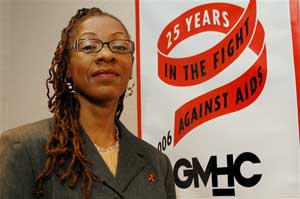-
- What’s in a name? For same-sex couples getting civil unions, confusion
- Poll: N.H. residents oppose same-sex marriage
- Brightening the holidays for kids with HIV/AIDS
- New chief executive of AIDS organization intends to battle stigma
- Web site owner says same-sex wedding industry is booming
- ‘Gay’ penguin book banned in Charlotte schools
- National News Briefs
- World News Briefs
national
New chief executive of AIDS organization intends to battle stigma
Psychologist Marjorie Hill of Gay Men’s Health Crisis has work cut out for her
Published Thursday, 28-Dec-2006 in issue 992
NEW YORK (AP) – For more than two decades, Marjorie Hill has been touched by AIDS.
In 1983, as the acronym AIDS was only just beginning to enter the public conversation, Hill watched a friend die.
The next decade, as director of former Mayor David N. Dinkins’ Office for the Lesbian and Gay Community, Hill attended so many funerals – at least one a week at one point – that she stopped going to them “for my own mental health.”
Now, Hill, at 50, is settling into a new job as chief executive of Gay Men’s Health Crisis, which calls itself the country’s oldest AIDS service organization, as it prepares to mark its 25th anniversary next month.
A quarter-century ago, when the U.S. epidemic began, GMHC’s main goal was helping people diagnosed with the heavily stigmatized disease die with dignity.
Although people are still dying from the disease (a GMHC staffer died this month), death rates have plummeted because of life-prolonging medications.
But stigma persists, and eradicating it, along with discrimination, will perhaps be Hill’s biggest challenge, she said.
It’s stigma and discrimination that keep people from getting tested and having honest conversations with relatives and sex partners out of fear of retaliation – a fear rooted in reality, Hill said.
Hill, a licensed clinical psychologist who leads a women’s support group at GMHC, told of a person who participates in her church’s AIDS ministry even as she keeps her own HIV-positive status secret.
“She has not shared with anyone in her congregation because of stigma,” Hill said as she sat in her Manhattan office. “She wants to do that work, she wants to be in the church and she wants to be there not as someone treated like a leper.”
“I really feel I’m just another runner,” Hill said later of her new job, which pays $203,000 a year. “I’m gonna run as fast and as hard as I can until it’s time to pass it on. During that run, I’m hoping to pass stigma, pass discrimination and pass racial and ethnic disparities” in infection and death rates.
Hill is not new to GMHC, having held several high-ranking positions since the mid-1990s.
In January, she became interim executive director following the departure of Ana Oliveira. The board announced her current appointment in October.
The new job is part of a management restructuring that eliminated the executive director position and also created the position of chief operating officer, held by GMHC veteran Robert Bank.
“We needed someone who is well known in the community, knows the issues related to the epidemic, not just in terms of the medical aspect but with the emotional and social aspects of it,” John E. Colon, chair of the organization’s board, said of Hill.
“She’s well known not only in the community but in Albany and Washington, D.C., as well as to other AIDS-based service organizations across the United States,” Colon said. “We needed someone who was respected and valued. We decided that she provided that public face for us that we needed.”
Hill grew up in the Bedford-Stuyvesant section of Brooklyn; she lives in Queens with her partner. She studied at Staten Island Community College and did doctoral work in clinical psychology at Adelphi University.
Before joining GMHC, she was assistant commissioner for the Bureau of HIV/AIDS in the city’s Department of Health and Mental Hygiene.
Earlier, in the 1980s, Hill and some colleagues at a Brooklyn hospital created a program to help children and their families with disclosure and family support – her first time dealing with the disease on a professional level.
Hill and GMHC have their work cut out for them. HIV/AIDS rates in New York City remain among the highest in the country, and African-Americans and Hispanics account for a disproportionate number of HIV infections, AIDS cases and deaths.
One particular challenge is getting through to indifferent young people who never witnessed AIDS-related deaths on the massive scale seen in the 1980s. Many of them think: “‘If I get AIDS I can take a pill, right? One pill a day like a vitamin, right?’” Hill said.
This year, GMHC saw 15,000 clients, 85 percent of whom live at or below the federal poverty level, officials said.
GMHC has a budget of about $27 million and a 206-member staff.
Although $27 million “is not a bad number,” the nonprofit could do more with more funding, Hill said.
The group has one mobile van for testing; it could use four, Hill said. Rather than rent one billboard for a month for $30,000, the organization would like to erect billboards for a year in the five boroughs.
The organization also would like to expand its support group for newly diagnosed people and its G.E.D program, as well as increase the amount of food it serves. But space and funds won’t allow for any of it.
Still, Hill’s not complaining. She will work with the resources on hand, she said.
“We see clients all the time. Sometimes they’re fine and sometimes they’re not fine,” Hill said. “My life is touched every day by a person living with the virus. Every single day. It influences what I do and keeps me passionate.”
|
|
Copyright © 2003-2025 Uptown Publications


